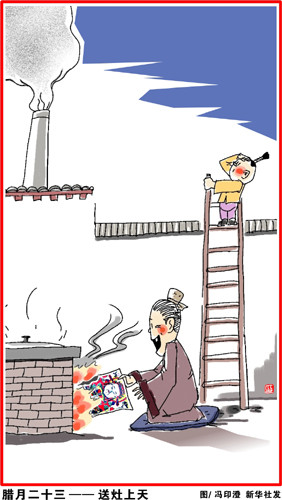Spring Festival, which falls on the 1st day of the 1st lunar month is the most important festival in China and a time for family reunion, like Christmas in the West.
农历正月初一开始,就到了中国最重要的节日——春节。人们阖家团圆,就如同西方的圣诞节一样。
Traditionally, Spring Festival starts in the early days of the 12th month of the lunar calendar and lasts until the middle of the 1st lunar month of the following year. With the modernization of China, some traditional customs are still followed today, but others have fallen by the wayside.
传统意义上的春节始于农历腊月(即十二月)初,一直持续到来年的正月(即一月)中旬。随着中国的现代化,一些传统习俗被保留了下来,而另一些却逐渐消失在我们的视野中。
As we are preparing for the most important festival, let's have a review of the traditional customs that celebrate the Spring Festival.
在我们忙着准备这个重大节日的同时,不妨来回顾一下春节有哪些传统习俗吧。

腊月二十三:送灶上天
Little New Year, which falls the 23rd day of the 12th month in the Lunar calendar, is also known as the Festival of the Kitchen God, the deity who oversees the moral character of each household.
农历腊月二十三日是小年,也是祭灶节。灶神在中国神话传说中监管一家善恶。
People make sacrifices to the Kitchen Gold on this day. A paper image is burnt dispatching the god's spirit to Heaven to report on the family's conduct over the past year. The Kitchen God is then welcomed back by pasting a new paper image of him beside the stove.
人们在小年这一天祭拜灶神,焚烧灶神的画像,意味着送灶神上天,禀报这家人在过去一年的德行。接着人们会在灶旁贴上新的画像,意味着再把灶神接回来。